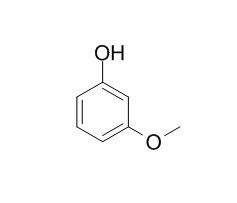m-Methoxyphenol
m-Methoxyphenol is a nartural product from Luculia pincia.
Inquire / Order:
manager@chemfaces.com
Technical Inquiries:
service@chemfaces.com
Tel:
+86-27-84237783
Fax:
+86-27-84254680
Address:
1 Building, No. 83, CheCheng Rd., Wuhan Economic and Technological Development Zone, Wuhan, Hubei 430056, PRC
Providing storage is as stated on the product vial and the vial is kept tightly sealed, the product can be stored for up to
24 months(2-8C).
Wherever possible, you should prepare and use solutions on the same day. However, if you need to make up stock solutions in advance, we recommend that you store the solution as aliquots in tightly sealed vials at -20C. Generally, these will be useable for up to two weeks. Before use, and prior to opening the vial we recommend that you allow your product to equilibrate to room temperature for at least 1 hour.
Need more advice on solubility, usage and handling? Please email to: service@chemfaces.com
The packaging of the product may have turned upside down during transportation, resulting in the natural compounds adhering to the neck or cap of the vial. take the vial out of its packaging and gently shake to let the compounds fall to the bottom of the vial. for liquid products, centrifuge at 200-500 RPM to gather the liquid at the bottom of the vial. try to avoid loss or contamination during handling.
Adv. Anim. Vet. Sci.2024, 12(4):732-741
Antioxidants (Basel).2020, 9(6):544.
Saudi Pharm J.2019, 27(1):145-153
Foods.2023, 12(12):2412.
Pharmacogn Mag.2015, 11(43):562-6
Chem Pharm Bull (Tokyo).2019, 67(11):1242-1247
Vietnam Journal of Food Control2022, 5(3):pp.390-401.
Antioxidants (Basel).2022, 11(1):171.
J Sep Sci.2019, 42(21):3352-3362
Int J Mol Sci.2019, 20(21):E5488
Related and Featured Products
Appl Environ Microbiol. 2004 Jun;70(6):3222-31.
Saturation mutagenesis of Burkholderia cepacia R34 2,4-dinitrotoluene dioxygenase at DntAc valine 350 for synthesizing nitrohydroquinone, methylhydroquinone, and methoxyhydroquinone.[Pubmed:
15184115]
METHODS AND RESULTS:
Saturation mutagenesis of the 2,4-dinitrotoluene dioxygenase (DDO) of Burkholderia cepacia R34 at position valine 350 of the DntAc alpha-subunit generated mutant V350F with significantly increased activity towards o-nitrophenol (47 times), m-nitrophenol (34 times), and o-methoxyphenol (174 times) as well as an expanded substrate range that now includes m-Methoxyphenol, o-cresol, and m-cresol (wild-type DDO had no detectable activity for these substrates). Another mutant, V350M, also displays increased activity towards o-nitrophenol (20 times) and o-methoxyphenol (162 times) as well as novel activity towards o-cresol. Products were synthesized using whole Escherichia coli TG1 cells expressing the recombinant R34 dntA loci from pBS(Kan)R34, and the initial rates of product formation were determined at 1 mM substrate by reverse-phase high-pressure liquid chromatography. V350F produced both nitrohydroquinone at a rate of 0.75 +/- 0.15 nmol/min/mg of protein and 3-nitrocatechol at a rate of 0.069 +/- 0.001 nmol/min/mg of protein from o-nitrophenol, 4-nitrocatechol from m-nitrophenol at 0.29 +/- 0.02 nmol/min/mg of protein, methoxyhydroquinone from o-methoxyphenol at 2.5 +/- 0.6 nmol/min/mg of protein, methoxyhydroquinone from m-Methoxyphenol at 0.55 +/- 0.02 nmol/min/mg of protein, both methylhydroquinone at 1.52 +/- 0.02 nmol/min/mg of protein and 2-hydroxybenzyl alcohol at 0.74 +/- 0.05 nmol/min/mg of protein from o-cresol, and methylhydroquinone at 0.43 +/- 0.1 nmol/min/mg of protein from m-cresol. V350M produced both nitrohydroquinone at a rate of 0.33 nmol/min/mg of protein and 3-nitrocatechol at 0.089 nmol/min/mg of protein from o-nitrophenol, methoxyhydroquinone from o-methoxyphenol at 2.4 nmol/min/mg of protein, methylhydroquinone at 1.97 nmol/min/mg of protein and 2-hydroxybenzyl alcohol at 0.11 nmol/min/mg of protein from o-cresol. The DDO variants V350F and V350M also exhibited 10-fold-enhanced activity towards naphthalene (8 +/- 2.6 nmol/min/mg of protein), forming (1R,2S)-cis-1,2-dihydro-1,2-dihydroxynaphthalene.
CONCLUSIONS:
Hence, mutagenesis of wild-type DDO through active-site engineering generated variants with relatively high rates toward a previously uncharacterized class of substituted phenols for the nitroarene dioxygenases; seven previously uncharacterized substrates were evaluated for wild-type DDO, and four novel monooxygenase-like products were found for the DDO variants V350F and V350M (methoxyhydroquinone, methylhydroquinone, 2-hydroxybenzyl alcohol, and 3-nitrocatechol).
J Org Chem. 2008 Mar 21;73(6):2408-11.
A meta effect in nonphotochemical processes: the homolytic chemistry of m-methoxyphenol.[Pubmed:
18294001]
The m-methoxy group is normally electron-withdrawing (EW), sigma(m) = +0.12, sigma(m+) = +0.05. The strong EW activity of a phenoxyl radical's O* atom causes the m-methoxy group to become electron-donating (ED), sigma(m)(+) = -0.14. In valence bond terms, this can be ascribed to the nonclassical resonance structures 1c-e. Although it has long been known that m-methoxy is ED in photoexcited states, it has now been found to be ED for homolytic O-H bond breaking in ground-state m-Methoxyphenol.
Biotechnol Bioeng. 2005 Dec 5;92(5):652-8.
Alanine 101 and alanine 110 of the alpha subunit of Pseudomonas stutzeri OX1 toluene-o-xylene monooxygenase influence the regiospecific oxidation of aromatics.[Pubmed:
16116657]
METHODS AND RESULTS:
By testing the substrates toluene, o-cresol, m-cresol, p-cresol, phenol, naphthalene, o-methoxyphenol, m-Methoxyphenol, p-methoxyphenol, o-xylene, and nitrobenzene, these positions were found to influence the regiospecific oxidation of aromatics. For example, compared to wild-type ToMO, TouA variant A101V produced threefold more 3-methoxycatechol from m-Methoxyphenol as well as produced methylhydroquinone from o-cresol whereas wild-type ToMO did not. Similarly, variant A110C synthesized 1.8-fold more o-cresol from toluene and 1.8-fold more 3-methoxycatechol from m-Methoxyphenol, and variant A110G synthesized more m-nitrophenol and twofold less p-nitrophenol from nitrobenzene. The A101V and A110C mutations did not affect the rate of reaction with the natural substrate toluene, so the variants had high activity.
CONCLUSIONS:
This is the first report that these or analogous residues influence the catalysis with this class of enzymes. Wild-type ToMO was found to oxidize o-methoxyphenol to methoxyhydroquinone (60%) and 4-methoxyresorcinol (40%), m-Methoxyphenol to 4-methoxycatechol (96%) and 3-methoxycatechol (4%), and p-methoxyphenol to 4-methoxycatechol (100%).



